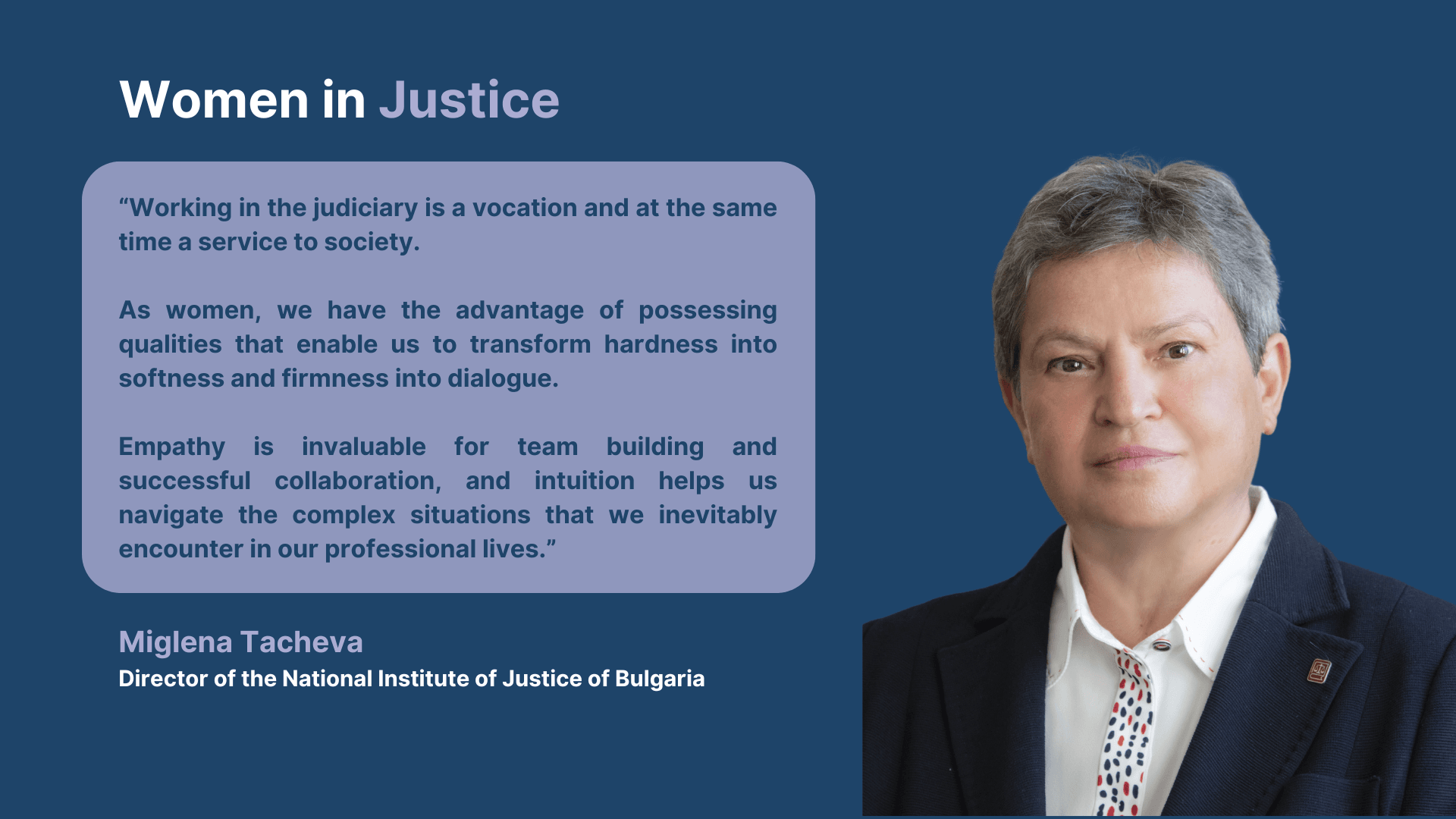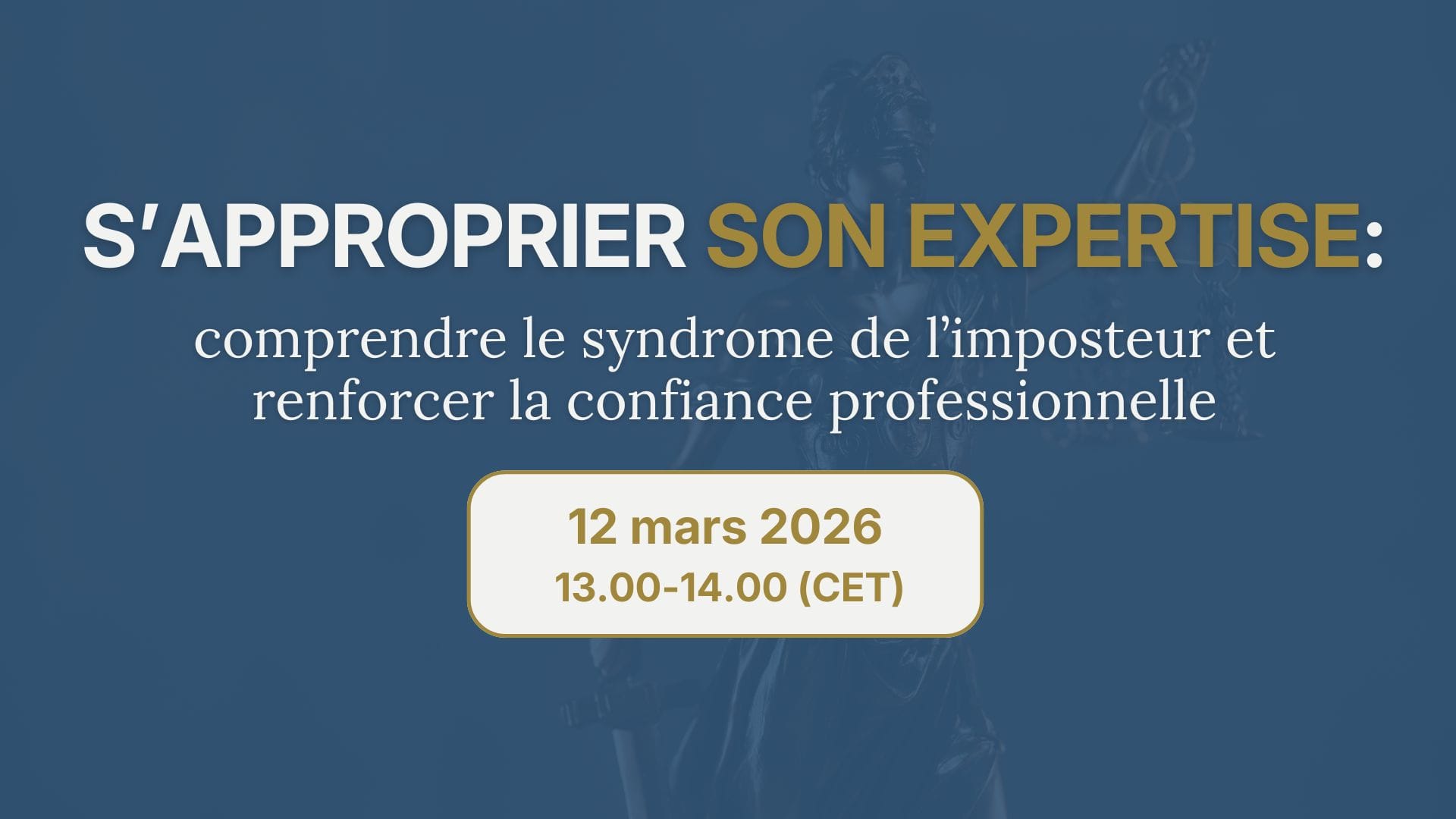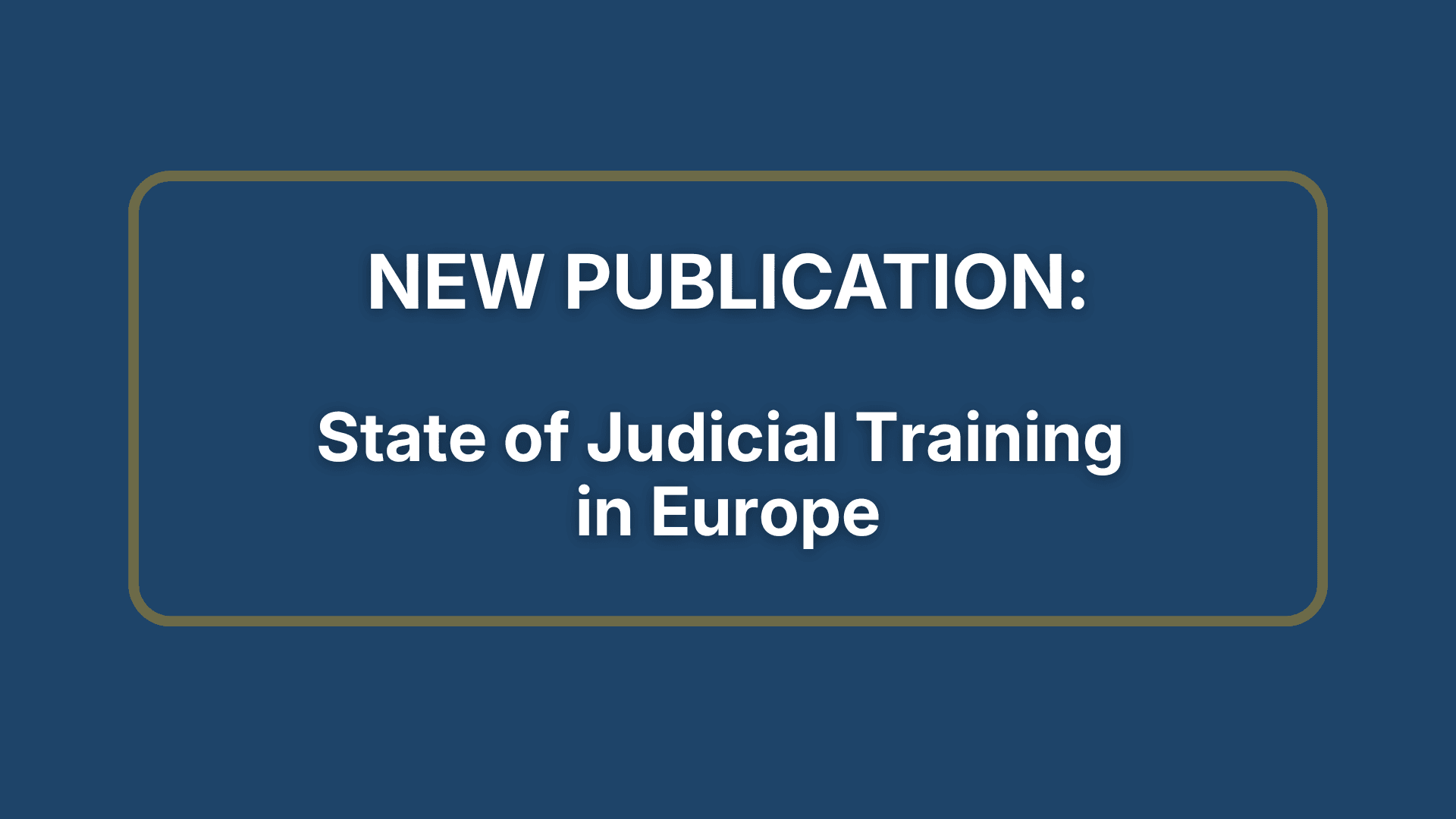Miglena Tacheva, the first female Minister of Justice and Keeper of the State Seal after the democratic changes in Bulgaria from 1989 and the first female Director of the National Institute of Justice of Bulgaria, has been a pioneering figure in Bulgaria’s justice sector. In her interview, she discusses her career in a traditionally male-dominated sector, the challenges women continue to face in the judiciary, and the importance of empowering the next generation of female legal professionals.
This interview series, launched in connection with the International Day of the Girl Child, highlights some of the inspiring women leaders within our Network.
Miglena Tacheva, as a former Minister of Justice, you have broken barriers in a traditionally male-dominated field. What challenges did you face as a woman in such a prominent leadership role, and how did you overcome them?
Historically, the judiciary has been dominated by men, although the personification of justice is represented by Themis, the Greek Goddess of Justice. We currently live in a time when women are successful leaders in all areas of public life – in Bulgaria, their equal participation in judiciary is a tradition that dates to the previous century. In 1966, Ms. Svetla Daskalova was appointed Minister of Justice as a result of the political situation, and she remained in the office for almost 24 years.
Linking this historical overview with my own professional experience, from a statistical viewpoint, I was the first female Minister of Justice and Keeper of the State Seal since the democratic changes in Bulgaria in 1989, and the first female Director of the National Institute of Justice in its 20-year history.
Despite the significant progress in gender equality over the last decades, we still encounter persistent stereotypes and prejudices, related to our social role as women: motherhood and family obligations cause many of us to accept lower positions. The ‘multifunctionality’ of the woman – her ability to take on multiple tasks – makes her more vulnerable.
Hence the mistrust with which we are often approached: can we perform equally well taking on a considerable share of family commitments alongside professional responsibilities? I am talking about the so-called invisible barriers that hinder women’s progress, summed up by the term ‘glass ceiling’.
The truth is that we, as women, have to work much harder than our male colleagues, constantly proving ourselves with professionalism, motivation and commitment.
The Day of the Girl celebrates young women and girls who aspire to make a difference in society. What message would you share with girls who dream of pursuing careers in law and justice?
Working in the judiciary is a vocation and at the same time a service to society.
As women, we have the advantage of possessing qualities that enable us to transform hardness into softness and firmness into dialogue. Empathy is invaluable for team building and successful collaboration, and intuition helps us navigate the complex situations that we inevitably encounter in our professional lives.
This set of fine traits, combined with professional skills and competences, makes us successful judicial leaders. Let me quote Margaret Thatcher, the first woman Prime Minister of the United Kingdom: “If you want something said, ask a man; if you want something done, ask a woman”.
Let me share with you an example from my professional journey: in 2007, as a Minister of Justice and Keeper of the State Seal, I was sitting in a cabinet in which, out of 17 ministers, five were women. In 2020, the EU Gender Equality Strategy was adopted, delivering on the commitment of the President of the European Commission, Ursula von der Leyen, to achieve a Union of Equality. We all have witnessed her efforts to ensure that the new European Commission is gender balanced. In the proposed draft, 11 out of 27 members of the Commission are women.
We still encounter the paradox of perceived equality, behind which are deeply instilled mental attitudes, shaped by historical, geographical and social factors.
Acknowledging gender equality as a core value of the European Union would not mean favouring women in a discriminatory way regarding men. It is essential to adopt and conduct clear and transparent procedures of recruitment and career promotion in the judiciary, thus ensuring informed and impartial decisions are made regarding a candidate’s skills and competencies. The Court of Justice of the European Union and the European Court of Human Rights have repeatedly stressed on the need for an objective assessment of the professional qualities of candidates, irrespective of their gender.
My message to all young colleagues entering the legal profession is: Uphold the law! The Digests of Justinian are timeless: “to live honestly, to injure no one, and give everyone his due.”
The European Judicial Training Network (EJTN) plays a key role in advancing judicial training across Europe. In your view, how can initiatives like EJTN help equip young women with the skills and confidence to succeed in the legal profession?
The role of the European Judicial Training Network in the professional advancement of judges, prosecutors and judicial officers is instrumental. A significant part of the trainings, provided by the Network, is devoted to gender equality and non-discrimination. One of the key themes of EJTN’s Conference of Director’s last year was the diversity in justice, including the aspect of overcoming gender stereotypes.
The Network is currently preparing a project ‘Women in Justice’, which could be the proper instrument for providing a forum for young female justice professionals, so that their voice can be heard; a forum where they can share common challenges and seek ways to overcome them.
Perhaps it is no coincidence that all these initiatives have been launched at a time when the EJTN Secretary General is Ms. Ingrid Derveaux. With her professionalism and commitment, she is an inspiring example for the young women judicial practitioners in Europe.
The new generation, the young colleagues entering the judiciary are the ones who can best orientate us to the challenges that lie ahead. An interesting topic that will be implemented as an EJTN seminar next year is “Adapting to Gen Z in judicial training“. Alongside EJTN, all of us, the leaders of the national training institutions, need to take stock and adapt our training to the generation of “digital natives” in terms of methodology, resources and formats.
Having worked at the highest levels of justice, how do you think gender equality and representation within the judiciary can be improved in Bulgaria and across Europe?
At the risk of bothering you with more statistics, I will mention some figures from the report of the Bulgarian National Statistical Institute, indicating that the highest share of leadership positions occupied by women is observed precisely in the judiciary – 53%, with the highest share of women judges in the administrative courts (77.9%) and the supreme courts (74.7%). It was in 2022, when for the first time in the 146-year history of the Bulgarian Supreme Court of Cassation, Judge Galina Zaharova was elected as its President. She also chairs the Managing Board of the National Institute of Justice.
The path to equal representation of women in justice is linked to the development and implementation of sustainable policies and measures at national and European levels. In 2022, The European Commission for the Efficiency of Justice (CEPEJ) adopted guidelines on gender equality in the recruitment and promotion of judges. These relate to creating a supportive work environment for women and promoting the appropriate balance between family and professional responsibilities.
Having said that, let me underline that gender equality cannot and should not be considered in isolation from other criteria that need to be taken into account in the recruitment and promotion procedures in the judiciary, such as professional skills and competences, and integrity.
In terms of judicial training, our Institute has integrated the principles of non-discrimination and gender equality in the initial and continuous training programmes. Another aspect that has been often neglected but worth noting, we must all work to build confidence and self-esteem in women entering the justice system so that they can overcome ‘glass ceilings’ and become successful judicial leaders. The non-legal skills trainings that EJTN and the NIJ conduct are a valuable tool to strengthen the motivation of women – judges, prosecutors and judicial employees – and to empower them in overcoming barriers to their professional development.
To learn more about the EJTN Member, National Institute of Justice of Bulgaria, you can visit their website.




